- Home
- Linda Lael Miller
Springwater Wedding Page 2
Springwater Wedding Read online
Page 2
“It’s probably a good thing we didn’t,” Maggie reflected.
“That isn’t what I asked you,” Daphne persisted.
Cornered, Maggie shrugged ruefully and hoisted her glass in a second salute. “All right, then,” she replied. “Yes, I would love to have a child and no, I don’t wish Connor and I had had one together.” A part of her, a reckless part she’d never shared with anyone, not even her dear friend, wished something altogether different—that she’d left Connor at the altar that long ago summer day, climbed into that battered old truck beside J.T., and sped away. Though she couldn’t rightly say how such an action would ultimately have affected J.T., there could be little doubt that she and Connor would both have been better off. Their marriage had been a mistake from the first, although they’d both tried valiantly to pretend otherwise.
“Do you realize that every woman from our graduating class— every last one of them, besides you and me—is a mother?” Although Daphne’s tone was light, even humorous, there was a frantic note to it. “Even Virginia Abbott.”
“There were only six of us,” Maggie pointed out reasonably, but she was a little stung by the comparison all the same. O.K., she’d married the wrong man. Instead of kids she had Sadie, a spoiled beagle now snoring on the hooked rug in the living room, with all four feet in the air. In general, though, Maggie had done pretty well in life: good grades in college; a fine job afterward, with profit-sharing and a 401(k) big enough to choke the proverbial horse; the intelligence, enthusiasm, and confidence to get a new business up and running. She was healthy, with a family and lots of friends, and happy, too, though there were nights when she lay awake, staring at the ceiling and feeling like a traveler who’s just missed the last boat to the land of milk and honey.
“Virginia Abbott,” Daphne marveled, sounding mildly disgusted. “Good Lord. A stretch in reform school and the world’s worst case of acne, and she still ended with a minivan, an adoring husband, and four kids!”
Maggie resigned herself to a lengthy diatribe, settling back in her chair and taking another long sip from her ice tea.
“And Polly Herrick,” Daphne went on. “Look at her. President of the P.T.A.!”
Maggie hid a smile.
All of the sudden, Daphne ran out of steam. She flung out her hands and gave a laughing sigh. “Listen to me running on,” she said. Then, with a glance at her watch, she got to her feet, rinsed her ice tea glass at the sink, and popped it into the top rack of the dishwasher. “I’ve got shopping to do. Ben is barbequing steaks tonight, and then we’re going to watch The Best Years of Our Lives on video. Join us?”
“Oh, right,” Maggie scoffed good-naturedly. “That would be cozy. The bride. The groom. The woman from across the street. Shall I bring my dog?”
Daphne laughed, getting to her feet. Now that school was out, she was on hiatus from teaching, and she insisted on helping Maggie with the heavy work over at the Springwater Station. They’d done the worst of the cleaning—the place had been closed up for several years—and for the past few days they’d been sorting through the contents of trunks, crates, and boxes, looking for old linens and other antiques that could be used to lend authenticity. “Tomorrow, then,” Daphne said. “We’re still going to that estate auction over in Maple Creek, right?”
Maggie nodded. “I’ll pick you up at six sharp. We can have breakfast on the way.”
Daphne, never an early riser, looked rueful. “Six sharp,” she confirmed, with a notable lack of enthusiasm. When she wasn’t teaching, she liked sleeping in. “See you then.”
With that, she was gone.
Sadie got up off the rug, stretched methodically in all directions, one leg at a time, and ambled into the kitchen area to check out her food bowl, the trunk of her body swaying from side to side as she went, like a sausage suspended on strings. Finding nothing there but half a dog biscuit and the remains of that morning’s breakfast, she raised baleful brown eyes to Maggie’s face and gave a despondent little whimper of protest.
“Did you know,” Maggie said, already headed toward the tiny laundry room at the back of the cottage, where she stored kibble, a fresh dog dish in hand, “that the typical beagle gets way too much to eat on account of ‘sad-eyes syndrome’?”
Sadie panted, wagging at warp speed. “Great,” she seemed to be saying. “It’s working.”
Maggie chuckled, shook her head, and gave the dog an early supper. While Sadie dined, Maggie slipped out onto the back step and watched the sun set behind the gazebo. The structure was all but swallowed up in climbing rose vines just beginning to bud, and it was not only innocuous, but beautiful, in a misty, Thomas Kinkaid sort of way. In the ten years since her wedding day she had returned to Springwater many times for holidays and short vacations and, rarely if ever, associated the gazebo with any unhappy memory. Now that Daphne had gone back to house and husband, though, it seemed that she couldn’t get J.T. out of her mind, couldn’t forget the way he’d looked in the golden light of that spring afternoon long ago—not just angry, but earnest and confounded and, worst of all, betrayed.
“I’m sorry,” she told his ghost, and turned to go back into the guest house.
J.T. gestured, in mid stride, toward the barn, with its sagging roof and leaning walls. The whole ranch was a disgrace; Scully and Evangeline, the first of the Springwater Wainwrights, must have rolled over in their graves more than once in the years since he’d turned his back on the land to play homicide cop in the Big Apple. His aunt Janeen had been too sick to run such a demanding enterprise, and her husband, Clive Jenson, had been no damned good. In point of fact, he’d abandoned Janeen, left her to die alone, devoured by cancer. Sometimes it seemed to J.T. that there was a curse on the Wainwright name, and on all the attendant property.
“Purvis,” he said to the older man double-stepping along beside him, “look at this place. I’d like to help you out. I really would. But I don’t have time to take on another job.”
Purvis Digg, a friend and contemporary of J.T.’s late father, Jack Wainwright, had served in Vietnam, and though he apparently didn’t suffer from flashbacks or delayed-stress syndrome like many of his fellow veterans, he’d somehow gotten stuck in the sixties just the same. He wore his salt-and-pepper hair long, even though it was thinning on top, and bound back with a leather bootlace. Sometimes he added a headband, Indian style, though J.T. had yet to see a feather. He sported a fringed buckskin jacket bought secondhand during the Johnson administration, combat boots, and thrift-store jeans embellished with everything from star-and-moon-shaped patches and old Boy Scout badges to grease stains.
“But you’re a cop,” Purvis argued.
Reaching the corral gate, which was falling apart like everything else in J.T.’s life, he stopped, one hand on the rusty latch. “I was a cop,” he corrected his old friend.
“Once a cop, always a cop,” Purvis said.
J.T. thrust splayed fingers through his dark hair. He’d lost his partner to a punk who would probably be back out on the street in another eighteen months, and taken a bullet himself, and while he’d recovered physically, he wasn’t sure he’d ever get over the memory of seeing Murphy fall. Then there was the funeral, watched on video in his hospital room: full honors; the brave, baffled face of the dead man’s widow; the plaintive wail of sorrow from his teenage daughter. “Look, Purvis—”
“Feel pretty damn sorry for yourself, don’t you?” Purvis broke in, reddening a little at the base of his jaw. Like most everybody else in and around Springwater, he knew all about what had happened in that warehouse six months back. “Well, here’s a flash for you, Junior: You’re not the first guy who ever lost somebody they cared about. Your dad was the best friend I ever had—we joined the service on the buddy plan, and he saved my life in ’Nam—and one fine day somebody shot him right out of the saddle, if you recall.”
Grief and exasperation made J.T.’s sigh sound the way it felt: raw. “Damn it, Purvis, that’s a low blow. Of course I ‘recall�
�!”
“Then you probably also recollect that nobody ever rounded up the shooter.”
J.T. clenched and unclenched his left fist. He could not, would not, hit a skinny old man, but the temptation was no less compelling. “I recollect, all right. I still have nightmares about it, on a regular basis.” Alternating with the ones about Murphy, he added to himself.
Purvis slapped him on the shoulder in an expression of manly commiseration. “Me, too. How old were you when Jack was murdered? Fourteen?”
“Thirteen,” J.T. said, averting his eyes for a moment, in order to gather his composure. His father had ridden in from the range that afternoon, on the first hot breath of a summer thunderstorm, so drenched in blood that it was hard to tell where the man stopped and the horse began.
J.T., working in the corral with a two-year-old gelding on a lead line, had vaulted over the fence and run toward his father. Jack had fallen from his paint stallion the same way Murphy had gone down in the warehouse, in an excruciatingly slow, rolling motion. And like Murphy, Jack Wainwright had most likely been dead before he struck the ground. J.T. had still been kneeling in the dirt, rocking Jack’s body in his arms, when Purvis, stopping by because someone had reported hearing a shot in the vicinity, had shown up in the squad car and radioed for an ambulance. It had been too late for J.T.’s dad. Too late, in some ways, for J.T. himself.
“I didn’t bring that up just for the hell of it,” Purvis said, in his gruff way. “And maybe it was a little below the belt. The thing is,
J.T., that wasn’t an isolated incident. Sure, we had a lot of relatively trouble-free years around here, but that’s all changed over the last couple of months. Some of the same crap that was going on back then is happening again now—the ranchers around here are losing livestock to theft and poison same as before. Just last month, somebody took a shot at Dave Knox while he was out looking for strays. And I’ve got me a crazy feeling that we’re dealing with the same outfit.”
J.T.’s next instinct was to grasp Purvis by the lapels of his campy jacket and wrench him onto the balls of his feet, but he restrained himself—the tendency to lose his cool had gotten him into trouble a few times, early in his career as a cop. A rap on the knuckles from the department, which included a series of anger-management classes, had pretty much straightened him out, but he still had to be careful.
“Are you telling me you think these are the same people who killed my father?” he demanded, after taking a long breath.
Purvis swallowed, then nodded. “Yup.”
“You got any proof of that?”
“No,” Purvis admitted. “Just an ache in my gut that says history is repeating itself.” He paused. “J.T., this situation ain’t gonna go away by itself. I ain’t as young as I used to be, and I can’t run these bastards down without some help. If I don’t get them, the ranchers will have my badge, and you know as well as I do that once I’m gone they’ll be up in arms like a bunch of yahoos out of some black-and-white western. We’ll have the feds crawling all over the valley after that, but not before a few more people get hurt or killed.”
“There must be somebody else,” J.T. breathed. He was weakening, and Purvis surely knew it. Digg would never be drafted into the Rocket Scientists’ Hall of Fame, but he was no rube, either. Law enforcement was not just his job, it was his religion.
“There’s nobody else,” Purvis insisted. “Oh, I could come up with a pack of hotheaded rednecks, call ’em a posse. But you’re the only professional around here, besides me. You’re a cop. You can ride and shoot. Besides that, you’re a rancher, just like them, and you’re Jack Wainwright’s son. You’ve got a stake in this too.”
J.T. was silent. Purvis might be a hick lawman from a hick town smack in the middle of no place, but he had the tenacity of a pit bull, and he could argue like a big-city lawyer when it served his purpose. Purvis came in for the kill. “What do you figure Jack would do, if he were in your place?”
J.T. closed his eyes, opened them again. The first seismic tremors of a headache stirred at the base of his skull. He didn’t have to guess what Jack Wainwright would do, or Murphy either. They would have pushed up their sleeves and stepped into the fray. “All right,” he said. “All right.”
Purvis grinned. “Judge Calloway can swear you in tomorrow,” he said.
“I’m going to an auction in the morning,” J.T. replied. An elderly, widowed rancher had died over at Maple Creek, and the estate was being liquidated. He intended to bid on a couple of quarter horses and maybe a beef or two. Then he’d be able to call this pitiful place a ranch again, with a semistraight face.
The marshal of Springwater could afford to be generous; he’d gotten what he wanted. “All right. We’ll have supper together tomorrow night, then, over at the Stagecoach CafÈ. You, me, and the judge. Be there by six.”
J.T. gave a rueful chuckle and shook his head. “You got it, Pilgrim.”
Purvis laughed, administered another resounding shoulder slap, and turned to head back to his antiquated, mud-splattered police car. Halfway there, he turned. “Say,” he added, as a jovial afterthought. “I reckon you know that Maggie McCaffrey’s back in town. Going to spit shine the old Springwater Station and make one of them fancy little hotels out of it.”
J.T. knew all about Maggie’s return to Springwater; uncannily, her homecoming had very nearly coincided with his own, though they’d managed to avoid running into each other so far. He hadn’t seen Maggie since the day he’d tried without success to keep her from marrying Connor Bartholomew. He’d made an ass of himself, in more ways than one, and even after all this time he wasn’t anxious to face her—and not just because he wasn’t good at apologizing. He’d been married, fathered a son, gotten divorced, and dated dozens of women, before and after his ex-wife, Annie, but somewhere down deep he’d always had a thing for Maggie. He’d known it, and so, unfortunately, had Annie.
Murphy had warned him. You’re going to blow it all if you’re not careful, he’d said. You’ve got a nice wife and a great kid, but all you think about, all you talk about, is this damn job. What are you saving yourself for? A second chance with your high school sweetheart? Wise up, cowboy. It isn’t what could have been that matters. It’s what is.
“I’ll have to stop by and say hello,” J.T. said to Purvis, as lightly as he could. “The Station’s been sitting empty for a long time. It’s good to know somebody is going to restore it.”
Purvis nodded. “A McCaffrey, too,” he agreed, pleased. “It’ll be almost like the old days, when Jacob and June-bug was runnin’ the place.”
J.T. might have laughed if he hadn’t just been roped into signing on for an indefinite stretch as Purvis’s deputy. The way the marshal talked, Jacob and June-bug McCaffrey were just out of town instead of dead and buried for well over a century. “Almost,” he agreed.
Purvis lifted a hand in farewell, climbed into his rig, and started up the engine. J.T. watched until the aging lawman had turned around and headed down the long dirt road leading to the highway.
“Shit,” J.T. said aloud. He gave the gate latch a pull, and the whole thing collapsed, clattering to the ground.
He hoped it wasn’t an omen.
The sky was pink and gold, with just the faintest rim of blue, when Maggie and Sadie pulled up in front of the old Hargreaves mansion across the street from the Springwater Station. Resigned to surrendering her shotgun seat, Sadie jumped nimbly into the back.
Maggie gave the horn a tentative tap, and Daphne immediately came out of the house, dressed, as Maggie was, in jeans, sneakers, and a lightweight blouse. Her hair was pulled back into a hasty ponytail, so that she resembled a teenager, and her fresh skin was bare of makeup.
“Coffee,” she pleaded. “Now.”
Maggie grinned. “Hang on, my friend,” she said. “McDonald’s is probably open.”
Daphne made an event of fastening her seatbelt, greeted Sadie, and yawned. “Even Ben is still asleep,” she said. An avowed workaholic
, her husband was notorious for getting up early. Before long he’d be out at the mine, directing crews and equipment.
Once they’d pulled out of the McDonald’s drive-through, Daphne became more voluble. “Don’t forget,” she said, sipping. “You promised us breakfast.” She looked back over the seat. “Didn’t she, Sadie?”
Sadie, lying on the seat with her muzzle resting on her paws, gave a cheerful whine.
“I’m a woman of my word,” Maggie assured them both.
Half an hour later they were in Maple Creek, just over the county line, waiting for a seat at Flo’s Diner. Because of the auction, which was to take place only a few miles away, the place was crowded.
“Look!” Daphne said, nudging Maggie. Flo was doing a brisk trade that morning, and it looked as though they might be standing for a while. “There’s J.T.”
Maggie followed her friend’s gaze to the dark-haired, dark-eyed man in the rear booth. In a decade, he’d changed, of course, but only for the better. The planes and angles of his face gave him a rugged look, and he was thicker through the shoulders and the chest. At Daphne’s exuberant wave, he grinned in that lazy, lopsided way Maggie had never been able to forget, and stood. With an easy gesture, he indicated the seats opposite his own.
“Come on,” Daphne said, and before Maggie could balk, her friend had linked arms with her and started toward J.T.’s table.
Maggie felt her face catch fire; she might have been sixteen instead of thirty. Her heart shinnied up into her throat and got itself stuck there, just like old times.
“Hi, J.T. What great luck, running into you,” Daphne chimed.
J.T.’s gaze lingered on Maggie, wry and all too knowledgeable. He obviously knew she would have preferred to be practically anywhere else besides Flo’s Diner, face-to-face with the first and only man she’d ever truly loved.
“Hello, Maggie,” he said, with a nod.
Maggie nodded back. “J.T.”
“Well,” said Daphne, “that was easy.” She sat down cheerfully, sliding to the inside of the booth and reaching for a menu.

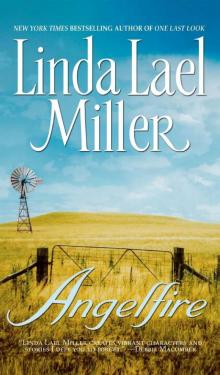 Angelfire
Angelfire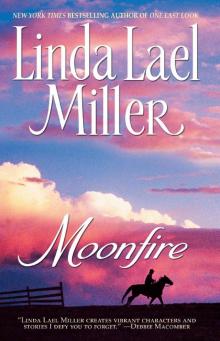 Moonfire
Moonfire The Yankee Widow
The Yankee Widow The Cowboy Way
The Cowboy Way Country Strong--A Novel
Country Strong--A Novel Forever and a Day
Forever and a Day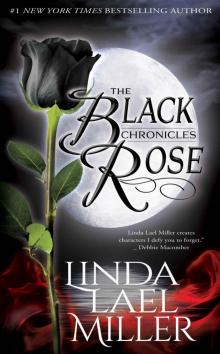 The Black Rose Chronicles
The Black Rose Chronicles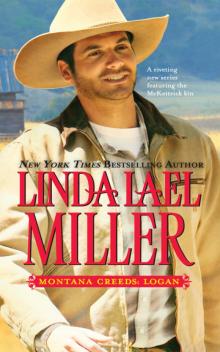 Montana Creeds: Logan
Montana Creeds: Logan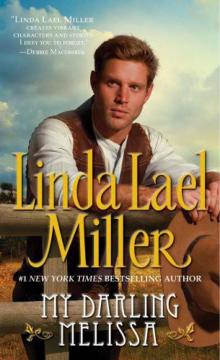 My Darling Melissa
My Darling Melissa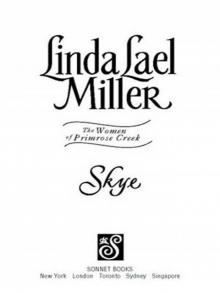 Skye
Skye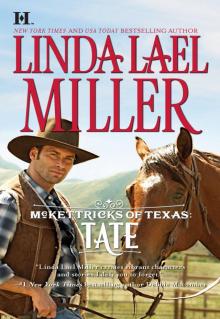 McKettricks of Texas: Tate
McKettricks of Texas: Tate Springwater Seasons
Springwater Seasons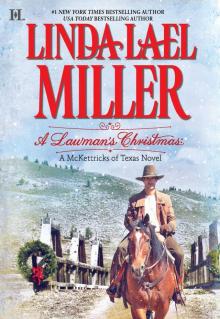 A Lawman's Christmas
A Lawman's Christmas Sierra's Homecoming
Sierra's Homecoming![Parable, Montana [4] Big Sky Summer Read online](http://i1.bookreadfree.com/i/03/22/parable_montana_4_big_sky_summer_preview.jpg) Parable, Montana [4] Big Sky Summer
Parable, Montana [4] Big Sky Summer One Last Weekend
One Last Weekend A Stone Creek Collection, Volume 2
A Stone Creek Collection, Volume 2 Tonight and Always
Tonight and Always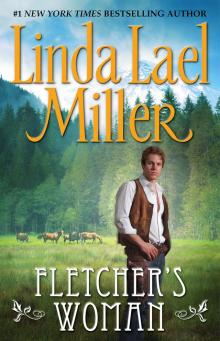 Fletcher's Woman
Fletcher's Woman A Snow Country Christmas
A Snow Country Christmas The Last Chance Cafe
The Last Chance Cafe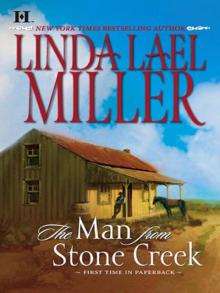 The Man from Stone Creek
The Man from Stone Creek Wanton Angel
Wanton Angel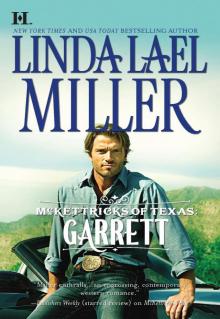 McKettricks of Texas: Garrett
McKettricks of Texas: Garrett Memory's Embrace
Memory's Embrace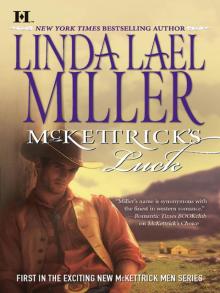 McKettrick's Luck
McKettrick's Luck Pirates
Pirates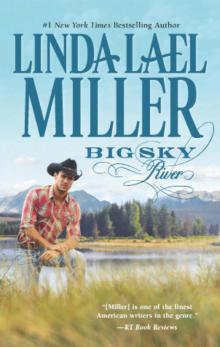 Big Sky River
Big Sky River Willow: A Novel (No Series)
Willow: A Novel (No Series)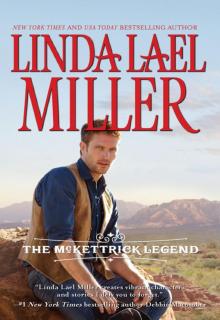 The McKettrick Legend: Sierra's HomecomingThe McKettrick Way (Hqn)
The McKettrick Legend: Sierra's HomecomingThe McKettrick Way (Hqn) Glory, Glory: Snowbound with the Bodyguard
Glory, Glory: Snowbound with the Bodyguard Two Brothers
Two Brothers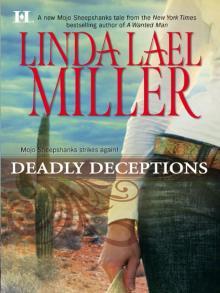 Deadly Deceptions
Deadly Deceptions Big Sky Secrets
Big Sky Secrets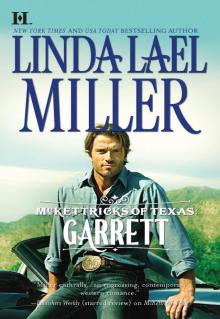 Garrett
Garrett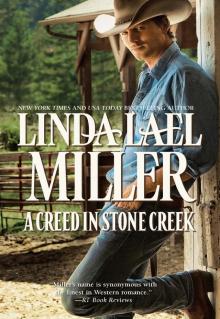 A Creed in Stone Creek
A Creed in Stone Creek Megan
Megan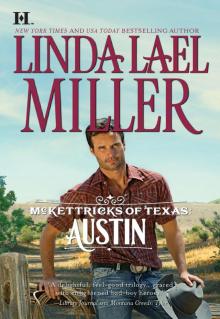 McKettricks of Texas: Austin
McKettricks of Texas: Austin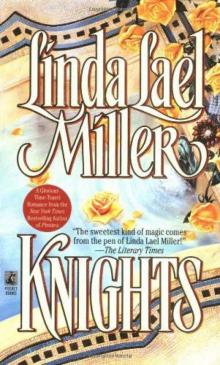 Knights
Knights High Country Bride
High Country Bride More Than Words Volume 4
More Than Words Volume 4 Glory, Glory
Glory, Glory Daring Moves
Daring Moves Lily and the Major
Lily and the Major Courting Susannah
Courting Susannah Banner O'Brien
Banner O'Brien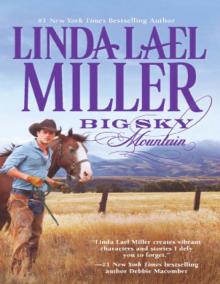 Big Sky Mountain
Big Sky Mountain Linda Lael Miller Bundle
Linda Lael Miller Bundle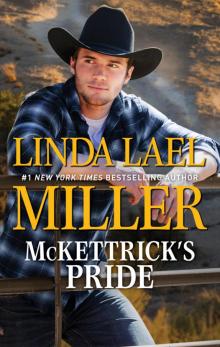 McKettrick's Pride
McKettrick's Pride A Stone Creek Collection Volume 1
A Stone Creek Collection Volume 1 A Wanted Man
A Wanted Man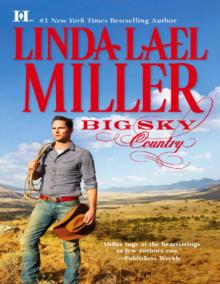 Big Sky Country
Big Sky Country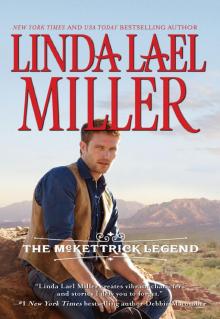 The McKettrick Legend
The McKettrick Legend Christy
Christy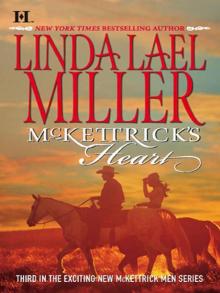 McKettrick's Heart
McKettrick's Heart Resurrection
Resurrection Arizona Heat
Arizona Heat Secondhand Bride
Secondhand Bride Snowflakes on the Sea
Snowflakes on the Sea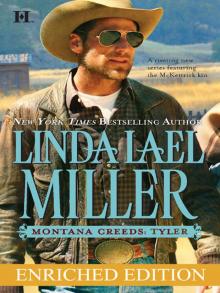 Montana Creeds: Tyler
Montana Creeds: Tyler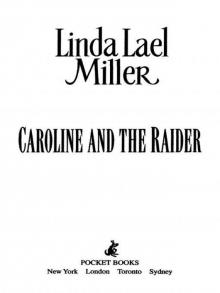 CAROLINE AND THE RAIDER
CAROLINE AND THE RAIDER A Proposal for Christmas: State SecretsThe Five Days of Christmas
A Proposal for Christmas: State SecretsThe Five Days of Christmas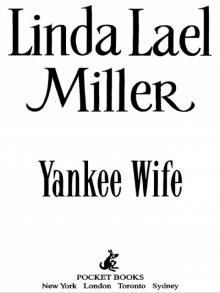 Yankee Wife
Yankee Wife Linda Lael Miller Montana Creeds Series Volume 1: Montana Creeds: LoganMontana Creeds: DylanMontana Creeds: Tyler
Linda Lael Miller Montana Creeds Series Volume 1: Montana Creeds: LoganMontana Creeds: DylanMontana Creeds: Tyler The Christmas Brides
The Christmas Brides McKettricks Bundle
McKettricks Bundle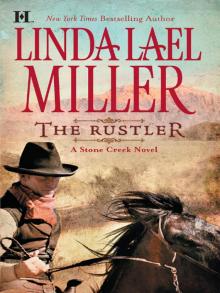 The Rustler
The Rustler Here and Then
Here and Then Only Forever
Only Forever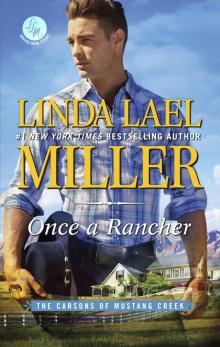 Once a Rancher
Once a Rancher The 24 Days of Christmas
The 24 Days of Christmas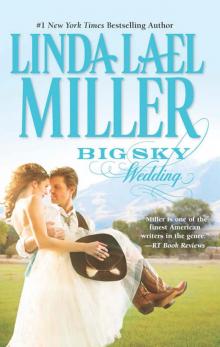 Big Sky Wedding
Big Sky Wedding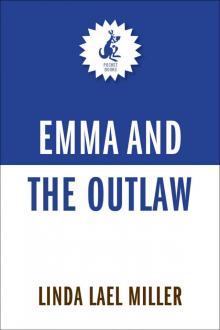 Emma and the Outlaw
Emma and the Outlaw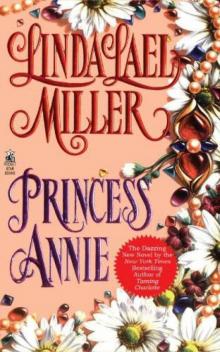 Princess Annie
Princess Annie Wild About Harry
Wild About Harry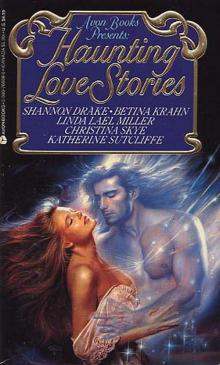 That Other Katherine
That Other Katherine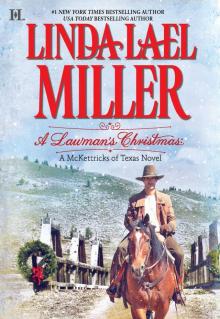 A Lawman's Christmas: A McKettricks of Texas Novel
A Lawman's Christmas: A McKettricks of Texas Novel Just Kate: His Only Wife (Bestselling Author Collection)
Just Kate: His Only Wife (Bestselling Author Collection)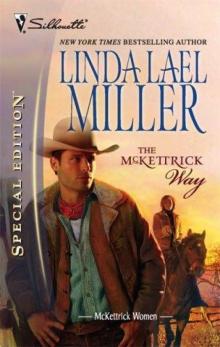 The McKettrick Way
The McKettrick Way Part of the Bargain
Part of the Bargain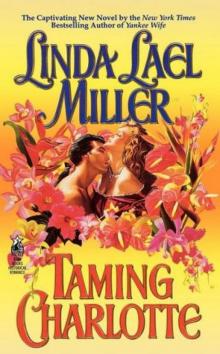 Taming Charlotte
Taming Charlotte Holiday in Stone Creek
Holiday in Stone Creek One Last Look
One Last Look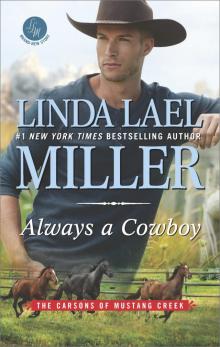 Always a Cowboy
Always a Cowboy Batteries Not Required
Batteries Not Required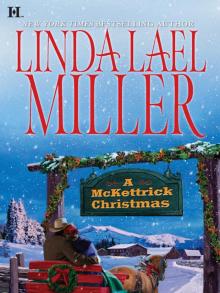 A McKettrick Christmas
A McKettrick Christmas For All Eternity
For All Eternity The Marriage Season
The Marriage Season Corbin's Fancy
Corbin's Fancy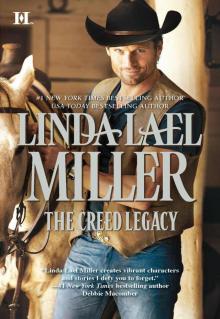 The Creed Legacy
The Creed Legacy Springwater Wedding
Springwater Wedding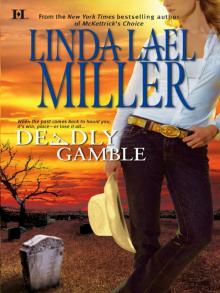 Deadly Gamble
Deadly Gamble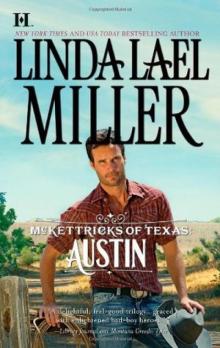 Austin
Austin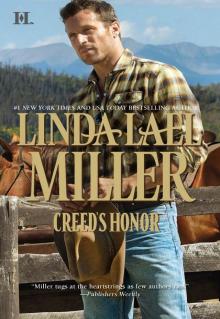 Creed's Honor
Creed's Honor A Creed Country Christmas
A Creed Country Christmas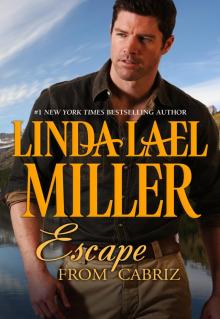 Escape from Cabriz
Escape from Cabriz There and Now
There and Now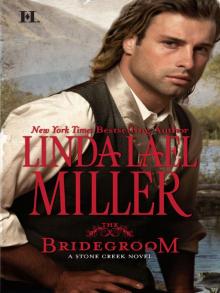 The Bridegroom
The Bridegroom State Secrets
State Secrets Bridget
Bridget